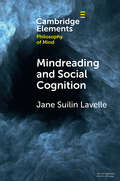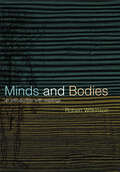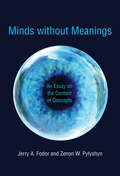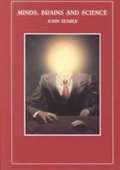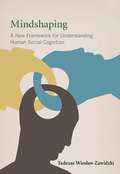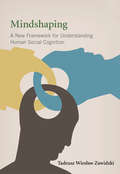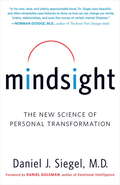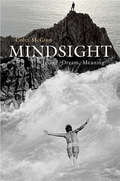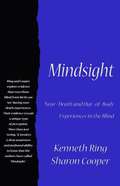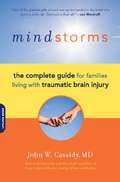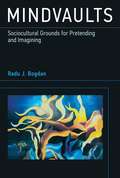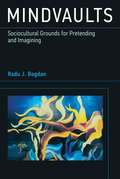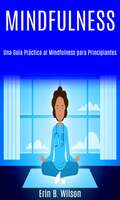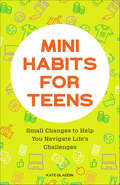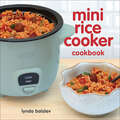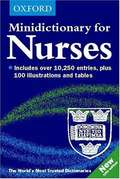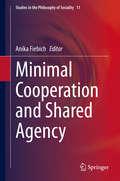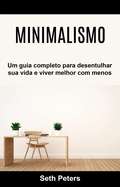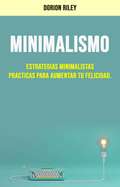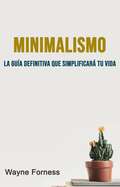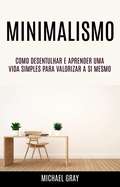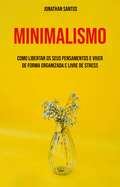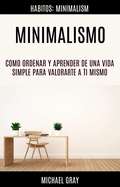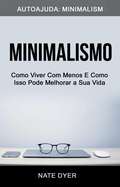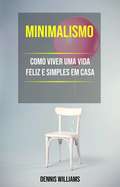- Table View
- List View
Mindreading and Social Cognition (Elements in Philosophy of Mind)
by Jane Suilin LavelleThe cognitive ability to think about other people's psychological states is known as `mindreading'. This Element critiques assumptions that have been formative in shaping philosophical theories of mindreading: that mindreading is ubiquitous, underpinning the vast majority of our social interactions; and that its primary goal is to provide predictions and explanations of other people's behaviour. It begins with an overview of key positions and empirical literature in the debate. It then introduces and motivates the pluralist turn in this literature, which challenges the core assumptions of the traditional views. The second part of the Element uses case studies to further motivate the pluralist framework, and to advocate the pluralist approach as the best way to progress our understanding of social cognitive phenomena.
Minds and Bodies: An Introduction with Readings (Philosophy and the Human Situation)
by Robert WilkinsonMinds and Bodies is a clear introduction to the mind-body problem. It requires no prior philosophical knowledge and is ideally suited to newcomers to philosophy and philosophy of mind. Robert Wilkinson carefully introduces the fundamental components of the philosophy of mind: Descartes's dualist account of mind and body; monist views including eliminativism; computer science and artificial intelligence. Each chapter is linked to a reading from key thinkers in the field, from Descartes to Paul Churchland.
Minds without Meanings: An Essay on the Content of Concepts (The\mit Press Ser.)
by Jerry A. Fodor Zenon W. PylyshynTwo prominent thinkers argue for the possibility of a theory of concepts that takes reference to be concepts' sole semantic property.In cognitive science, conceptual content is frequently understood as the “meaning” of a mental representation. This position raises largely empirical questions about what concepts are, what form they take in mental processes, and how they connect to the world they are about. In Minds without Meaning, Jerry Fodor and Zenon Pylyshyn review some of the proposals put forward to answer these questions and find that none of them is remotely defensible.Fodor and Pylyshyn determine that all of these proposals share a commitment to a two-factor theory of conceptual content, which holds that the content of a concept consists of its sense together with its reference. Fodor and Pylyshyn argue instead that there is no conclusive case against the possibility of a theory of concepts that takes reference as their sole semantic property. Such a theory, if correct, would provide for the naturalistic account of content that cognitive science lacks—and badly needs. Fodor and Pylyshyn offer a sketch of how this theory might be developed into an account of perceptual reference that is broadly compatible with empirical findings and with the view that the mental processes effecting perceptual reference are largely preconceptual, modular, and encapsulated.
Minds, Brains And Science
by John SearleMinds, Brains and Science takes up just the problems that perplex people, and it does what good philosophy always does: it dispels the illusion caused by the specious collision of truths. How do we reconcile common sense and science? John Searle argues vigorously that the truths of common sense and the truths of science are both right and that the only question is how to fit them together. <p><p> Searle explains how we can reconcile an intuitive view of ourselves as conscious, free, rational agents with a universe that science tells us consists of mindless physical particles. He briskly and lucidly sets out his arguments against the familiar positions in the philosophy of mind, and details the consequences of his ideas for the mind-body problem, artificial intelligence, cognitive science, questions of action and free will, and the philosophy of the social sciences.
Mindshaping
by Tadeusz Wieslaw ZawidzkiIn this novel account of distinctively human social cognition, Tadeusz Zawidzkiargues that the key distinction between human and nonhuman social cognition consists in our complex,diverse, and flexible capacities to shape each other's minds in ways that make them easier to interpret. Zawidzki proposes that such "mindshaping" -- which takes the form of capacities and practices such as sophisticated imitation, pedagogy, conformity to norms, and narrative self-constitution -- is the most important component of human social cognition. Without it, heargues, none of the other components of what he terms the "human sociocognitive syndrome," including sophisticated language, cooperation, and sophisticated "mind reading," would be possible. Challenging the dominant view that sophisticated mind reading -- especially propositional attitude attribution -- is the key evolutionary innovation behind distinctively human social cognition, Zawidzki contends that the capacity to attribute such mental states depends on the evolution of mindshaping practices. Propositional attitude attribution, he argues, is likely to be unreliable unless most of us are shaped to have similar kinds of propositional attitudes in similar circumstances. Motivations to mindshape, selected to make sophisticated cooperation possible,combine with low-level mind reading abilities that we share with nonhuman species to make it easier for humans to interpret and anticipate each other's behavior. Eventually, this led, in human prehistory, to the capacity to attribute full-blown propositional attitudes accurately -- a capacity that is parasitic, in phylogeny and today, on prior capacities to shape minds. Bringing together findings from developmental psychology, comparative psychology, evolutionary psychology, and philosophy of psychology, Zawidzki offers a strikingly original framework for understanding human social cognition.
Mindshaping: A New Framework for Understanding Human Social Cognition
by Tadeusz Wieslaw ZawidzkiA proposal that human social cognition would not have evolved without mechanisms and practices that shape minds in ways that make them easier to interpret. In this novel account of distinctively human social cognition, Tadeusz Zawidzki argues that the key distinction between human and nonhuman social cognition consists in our complex, diverse, and flexible capacities to shape each other's minds in ways that make them easier to interpret. Zawidzki proposes that such "mindshaping"—which takes the form of capacities and practices such as sophisticated imitation, pedagogy, conformity to norms, and narrative self-constitution—is the most important component of human social cognition. Without it, he argues, none of the other components of what he terms the "human sociocognitive syndrome," including sophisticated language, cooperation, and sophisticated "mindreading," would be possible. Challenging the dominant view that sophisticated mindreading—especially propositional attitude attribution—is the key evolutionary innovation behind distinctively human social cognition, Zawidzki contends that the capacity to attribute such mental states depends on the evolution of mindshaping practices. Propositional attitude attribution, he argues, is likely to be unreliable unless most of us are shaped to have similar kinds of propositional attitudes in similar circumstances. Motivations to mindshape, selected to make sophisticated cooperation possible, combine with low-level mindreading abilities that we share with nonhuman species to make it easier for humans to interpret and anticipate each other's behavior. Eventually, this led, in human prehistory, to the capacity to attribute full-blown propositional attitudes accurately—a capacity that is parasitic, in phylogeny and today, on prior capacities to shape minds.Bringing together findings from developmental psychology, comparative psychology, evolutionary psychology, and philosophy of psychology, Zawidzki offers a strikingly original framework for understanding human social cognition.
Mindsight
by Daniel J. SiegelForeword by Daniel Goleman, author of Emotional Intelligence.This groundbreaking book, from one of the global innovators in the integration of brain science with psychotherapy, offers an extraordinary guide to the practice of "mindsight," the potent skill that is the basis for both emotional and social intelligence. From anxiety to depression and feelings of shame and inadequacy, from mood swings to addictions, OCD, and traumatic memories, most of us have a mental "trap" that causes recurring conflict in our lives and relationships. Daniel J. Siegel, M.D., a clinical professor of psychiatry at the UCLA School of Medicine and co-director of the UCLA Mindful Awareness Research Center, shows us how to use mindsight to escape these traps. Through his synthesis of a broad range of scientific research with applications to everyday life, Dr. Siegel has developed novel approaches that have helped hundreds of patients free themselves from obstacles blocking their happiness. By cultivating mindsight, all of us can effect positive, lasting changes in our brains--and our lives. A book as inspiring as it is profound, Mindsight can help us master our emotions, heal our relationships, and reach our fullest potential.
Mindsight: Image, Dream, Meaning
by Colin McGinnHow to imagine the imagination is a topic that draws philosophers the way flowers draw honeybees. From Plato and Aristotle to Wittgenstein and Sartre, philosophers have talked and written about this most elusive of topics--that is, until contemporary analytic philosophy of mind developed. Perhaps it is the vast range of the topic that has scared off our contemporaries, ranging as it does from mental images to daydreams. The guiding thread of this book is the distinction Colin McGinn draws between perception and imagination. Clearly, seeing an object is similar in certain respects to forming a mental image of it, but it is also different. McGinn shows what the differences are, arguing that imagination is a sui generis mental faculty. He goes on to discuss the nature of dreaming and madness, contending that these are primarily imaginative phenomena. In the second half of the book McGinn focuses on what he calls cognitive (as opposed to sensory) imagination, and investigates the role of imagination in logical reasoning, belief formation, the understanding of negation and possibility, and the comprehension of meaning. His overall claim is that imagination pervades our mental life, obeys its own distinctive principles, and merits much more attention.
Mindsight: Near-Death and Out-of-Body Experiences in the Blind
by Kenneth Ring Sharon Cooper<P>Ring and Cooper explore evidence that even those blind from birth can "see" during near-death experiences. Their evidence reveals a unique type of perception. More than just "seeing", it involves a deep awareness and profound ability to know that the authors have called "Mindsight". <P>This volume is a ground-breaking work in the field of near-death studies. It investigates the astonishing claim that blind persons, including those blind from birth, can actually "see" during near-death or out-of-body episodes. The authors present their findings in scrupulous detail, investigating case histories of blind persons who have actually reported visual experiences under these conditions.
Mindstorms: The Complete Guide for Families Living with Traumatic Brain Injury
by Lee Woodruff John W. CassidyIf your loved one has experienced a traumatic brain injury (TBI), you know that its effects can be devastating and often difficult to understand It may feel as if your world has shifted on its axis, and you'll never get your bearings. Navigating your way through the morass of doctors, medical terms, and the healthcare system can be daunting, especially when you want only what's best for the person you love. Dr. John Cassidy has devoted the past twenty-five years to helping families cope with traumatic brain injury; Mindstorms is his compassionate, comprehensive manual to demystifying this often frightening and life-changing condition.More than 6.3 million Americans live with a severe disability caused by a traumatic brain injury. In fact, because it's so commonplace, but little talked of, TBI is often referred to as the "silent epidemic." In these pages, Dr. Cassidy walks you through the different types of brain injury; explodes the common myths surrounding it; demonstrates the ways in which TBI may affect memory, behavior, and social interaction; explores the newest options in treatment and rehabilitation; and shows you how to hold on to your own sense of self as you journey through. Along with the practical information you'll need, Mindstorms offers a constellation of instructive, moving stories from families and patients who are slowly, but surely, finding their way back. Their experiences are sure to inspire you and yours.
Mindvaults: Sociocultural Grounds for Pretending and Imagining
by Radu J. BogdanThe human mind has the capacity to vault over the realm of current perception,motivation, emotion, and action, to leap -- consciously and deliberately -- to past or future,possible or impossible, abstract or concrete scenarios and situations. In this book, Radu Bogdanexamines the roots of this uniquely human ability, which he terms "mindvaulting. " He focusesparticularly on the capacities of pretending and imagining, which he identifies as the first formsof mindvaulting to develop in childhood. Pretending and imagining, Bogdan argues, are crucial stepson the ontogenetic staircase to the intellect. Bogdan finds that pretending and then imaginingdevelop from a variety of sources for reasons that are specific and unique to human childhood. Heargues that these capacities arise as responses to sociocultural and sociopolitical pressures thatemerge at different stages of childhood. Bogdan argues that some of the properties of mindvaulting-- including domain versatility and nonmodularity -- resist standard evolutionary explanations. Toresolve this puzzle, Bogdan reorients the evolutionary analysis toward human ontogeny, construed asa genuine space of evolution with specific pressures and adaptive responses. Bogdan finds thatpretending is an ontogenetic response to sociocultural challenges in early childhood, apre-adaptation for imagining; after age four, the adaptive response to cooperative and competitivesociopolitical pressures is a competence for mental strategizing that morphs intoimagining.
Mindvaults: Sociocultural Grounds for Pretending and Imagining (The\mit Press Ser.)
by Radu J. BogdanAn argument that the uniquely human capacities of pretending and imagining develop in response to sociocultural and sociopolitical pressures in childhood.The human mind has the capacity to vault over the realm of current perception, motivation, emotion, and action, to leap—consciously and deliberately—to past or future, possible or impossible, abstract or concrete scenarios and situations. In this book, Radu Bogdan examines the roots of this uniquely human ability, which he terms "mindvaulting." He focuses particularly on the capacities of pretending and imagining, which he identifies as the first forms of mindvaulting to develop in childhood. Pretending and imagining, Bogdan argues, are crucial steps on the ontogenetic staircase to the intellect.Bogdan finds that pretending and then imagining develop from a variety of sources for reasons that are specific and unique to human childhood. He argues that these capacities arise as responses to sociocultural and sociopolitical pressures that emerge at different stages of childhood. Bogdan argues that some of the properties of mindvaulting—including domain versatility and nonmodularity—resist standard evolutionary explanations. To resolve this puzzle, Bogdan reorients the evolutionary analysis toward human ontogeny, construed as a genuine space of evolution with specific pressures and adaptive responses. Bogdan finds that pretending is an ontogenetic response to sociocultural challenges in early childhood, a pre-adaptation for imagining; after age four, the adaptive response to cooperative and competitive sociopolitical pressures is a competence for mental strategizing that morphs into imagining.
Minfulness: Técnicas Prácticas para Mejorar la Salud Mental y Física
by Erin B. WilsonEl verdadero objetivo de la meditación, para poder traer relajación, es el estar consciente. De eso es de lo que se trata la meditación minfulness y es lo que aprenderás de este libro. sin embargo, las técnicas de mindfulness van más allá de sólo meditar. En éste libro aprenderás: •- De qué trata la meditación mindfulness •- La diferencia entre mindfulness y meditación •- Cómo meditar para una consciencia mindful •- Prácticas mindful que te benefician mental, física y socialmente •- Diferencias entre acercamientos tradicionales orientales y modernos occidentales •- Practicar cada día los consejos para entrenarte en mindfulness •- Y mucho más.. Antes de ver cómo el midfulness puede ayudarte, es importante detenerse y entender que es el mindfulness. quiero decir, probablemente has escuchado mucho sobre ello, pero ¿realmente sabes qué es? Si no sabes qué es ¿Cómo esperas saber si lograste?
Mini Habits for Teens: Small Changes to Help You Navigate Life's Challenges
by Kate GladdinSmall steps to help teens build a foundation for successThere's no action too small when it comes to creating better habits. For teens looking to boost their grades, make a new friend, or save money for something special, forming healthy habits is the key to success both right now and in the future. Mini Habits for Teens shows them how to build good habits that stick, with easy advice for practicing little, everyday changes that help them work toward their goals one step at a time.What is a habit?—Learn the science behind what mini habits are and the three steps for turning positive behavior into something that's easy to do consistently.Home, school, and beyond—Discover how different habits can affect all areas of life, including health, relationships, social skills, and academic achievement.How habits can help—Experience the ways that mini habits like a regular sleep schedule or an organized studying style can make every day feel easier and more rewarding.Develop the little skills that create a sense of confidence and achievement with Mini Habits for Teens.
Mini Rice Cooker Cookbook
by Lynda BalslevDiscover how to cook breakfast, soups & stews, salads & bowls, entrées, and desserts with this collection of recipes for your mini rice cooker.Looking for a fast dinner, dessert, or a tasty snack, the Mini Rice Cooker Cookbook has something for you. Forget your Crock-Pot, the bright-colored mini rice cooker is your new easy-to-use, easy-to-cook solution for everything from eggs to pad thai to chocolate cake.The perfect complement to your new appliance, the Mini Rice Cooker Cookbook has fresh ideas for every occasion, from breakfast to dessert. A mini rice cooker is perfect for cramped college dorms, small apartments, even RVs. You don’t need extra kitchen tools like pots and pans for these recipes. Offering vegetarian, vegan, or gluten-free variations, the recipes in this cookbook are sure to stretch your imagination for what a rice cooker can do. Recipes include pasta, soup, stew, beans, grains, cakes, breads, and more.
Minidictionary for Nurses (5th edition)
by Elizabeth A. Martin Tanya A. McferranThe fifth edition of this best-selling and trusted dictionary has been fully updated and revised to take account of recent developments in nursing practice and related fields. Updates cover the fields of surgical techniques, paediatrics, gynaecology, nephrology, endocrinology, and ENT, as well as the latest reorganization of the National Health Service. Fully revised, this dictionary provides comprehensive coverage of the ever-expanding vocabulary of the nursing professions. In addition to specifically nursing terms, there are many entries in the fields of medicine, anatomy, physiology, psychiatry, nutrition, and pharmacology (including new drugs recently introduced into medical practice). Over 10,100 clear and concise entries, all written by medical and nursing specialists, cover the theory and practice of nursing. 100 helpful illustrations and 12 appendices covering nutritional requirements, normal values for biochemical and haematological data, standard values for body weight, and much more, make this an invaluable reference tool for all nursing students and professionals.
Minimal Cooperation and Shared Agency (Studies in the Philosophy of Sociality #11)
by Anika FiebichThis volume examines minimality in cooperation and shared agency from various angles. It features essays written by top scholars in the philosophy of mind and action. Taken together, the essays provide a genuine contribution to the contemporary joint action debate.The main accounts in this debate present sufficient rather than necessary or minimal criteria for there to be cooperation. Much discussion in the debate deals with robust rather than more attenuate and simple cases of cooperation or shared agency. Focusing on such minimal cases, however, may help to explain how cooperation comes into existence and how minimal cooperation interrelates with more complex cases of cooperation. The contributors discuss minimality in cooperation by focusing on particular aspects. For example, they consider how social roles might deliver minimal cooperation constraints or what the minimal contextual criteria are for cooperation to emerge.Readers will find the answers to these and other questions: What is minimally cooperative behavior? By what steps could full members of a society organized by conventions, norms and institutions be constructed from creatures with minimal social skills and cognitive abilities? What do we experience of actions when we act together with a purpose?
Minimalismo - Um guia completo para desentulhar sua vida e viver melhor com menos
by Seth PetersVocê está cansado da dependência que você se encontra após perseguir todas as coisas boas que todos parecem querer o tempo todo? Você descobriu que elas não parecem acrescentar na sua felicidade? A TV a cabo, a larga TV, os muitos pares de sapatos, as muitas roupas, etc; Elas te trouxeram felicidade? Apesar do que a sociedade nos ensinou através de propagandas, bens materiais não aumentam a felicidade! Aprenda técnicas neste livro para melhorar sua qualidade Imagine se você pudesse entrar no seu guarda roupa e fosse capaz de escolher um conjunto em minutos sem reconsiderar ou encarar uma montanha de roupas que muito provavelmente não viu a luz do dia por meses ou até anos. Quando você tem controle sobre seus pensamentos e ações, então a sua autoestima aumentaria, e você irá aprender também como se desenvolver em uma maneira que você se tornaria uma pessoa melhor e mais forte. Aprenda como desenvolver sua autoestima e aproveite a vida com as dicas providas por este livro. Leia e descubra!
Minimalismo : Estrategias Minimalistas Practicas Para Aumentar Tu Felicidad.
by Dorion RileyEsta guía tiene como propósito proveerte con una fácil y clara introducción en desenmascarar los mitos y las ideas falsas acerca del minimalismo. El libro lo finalizara con el espíritu y estilo de vida de los minimalistas como una elección de vida, también como una simple forma nueva de ver a las prácticas existentes. Los beneficios del minimalismo son muchos y este libro expondrá todas las ventajas positivas que esta sencilla filosofía puede ofrecer a su vida. La simplicidad es la llave y uno de los múltiples beneficios y atributos. A la mayoría de las cosas que poseemos, ni si quiera les prestamos atención en nuestro día a día. Usted debe tener hallazgos, cosas alrededor de su casa que solo ve una vez al año, y aun así continúa encontrándolas en casa durante la limpieza de primavera. Usted las limpia, medita acerca de ellas un poco, en los recuerdos que traen y las regresa a ese lugar secreto. Entonces usted se olvida de ellas por al menos algunos meses. ¿Que está esperando? No espere un momento más! Deslícese hacia arriba y de click en comprar ahora para empezar el camino a la vida de sus sueños!
Minimalismo : La Guía Definitiva Que Simplificará Tu Vida
by Wayne FornessLa siguiente es una guía dedicada a explicar de manera breve, en qué consisite el estilo de vida minimalista, y cómo seguir el camino hacia ella, de manera sucinta y accesible. Esperramos sea de su agrado
Minimalismo: Como Desentulhar E Aprender Uma Vida Simples Para Valorizar A Si Mesmo
by Michael GrayEste livro também explicará por que essas dicas são importantes, o que significa que quando você terminar de ler, você saberá as razões por trás das ações, não apenas as ações em si. Isso é sempre importante para quem quer ser bem sucedido na busca de um estilo de vida minimalista. Eu gostaria de aproximar você de um estilo de vida que é o oposto do consumo excessivo: o minimalismo. O minimalismo trará serenidade, paz e alegria de volta à sua vida. Através deste livro, você entenderá porque é hora de virar as costas para a sociedade de consumo e cultivar um estilo de vida minimalista. Aqui vou dar-lhe um passo a passo detalhado para o seu próprio caminho individual para uma vida minimalista. Então você vai se sentir como eu no meu passado, até que eu mudei minha vida e mudei para um estilo de vida minimalista! Então não hesite e comece agora uma vida simples, feliz e sem stress com o meu guia minimalista !!! Role para cima para comprar sua cópia hoje!
Minimalismo: Como Libertar Os Seus Pensamentos E Viver De Forma Organizada E Livre De Stress
by Jonathan SantosEste livro procurará abordar a importância de abraçar um estilo de vida minimalista e a forma como organizar um lar para que possa disfrutar dos benefícios de uma casa arrumada. Um dos benefícios será a paz de espírito que irá encontrar, ou tal como lhe chamamos, uma paz Zen - um estado maior de consiência que nos poderá ajudar a sentir completamente preenchidos e felizes. A alimentaçao será o consumível mais benéfico para abordar ao nível individual. É o que terá mais impacto imediato no seu orçamento, estômago e cérebro. A Limpeza do Consumo, um mapa sensato, baseado na investigação e concretizável para um consumo consciente de alimentação e bebidas. O autor trouxe a nú o marketing e o disparate corporativo que envolve muitos dos nossos alimentos comuns para revelar a verdade sobre o que comemos. Se está pronto para passar à ação e mudar a sua vida para melhor, este livro irá, definitivamente guiá-lo na direção certa!
Minimalismo: Como Ordenar Y Aprender De Una Vida Simple Para Valorarte a Ti Mismo (Habitos: Minimalism)
by Shawn JonesEste libro también explicará por qué estos consejos son importantes, lo que significa que cuando termine de leer sabrá las razones detrás de las acciones, no solo las acciones en sí. Esto siempre es importante para cualquier persona que quiera tener éxito en la búsqueda de un estilo de vida minimalista. Me gustaría acercarle a un estilo de vida que es lo opuesto al consumo excesivo: el minimalismo. El minimalismo traerá serenidad, paz y alegría a tu vida. A través de este libro, comprenderá por qué es hora de dar la espalda a la sociedad de consumo y cultivar un estilo de vida minimalista. Aquí le daré una guía detallada paso a paso para su propio camino individual hacia una vida minimalista. ¡Entonces te sentirás igual que yo en mi pasado hasta que haya cambiado mi vida y haya cambiado a un estilo de vida minimalista! Así que no dude y comience ahora a vivir una vida simple, feliz y sin estrés con mi guía de minimalismo.
Minimalismo: Como Viver Com Menos E Como Isso Pode Melhorar a Sua Vida (Autoajuda: Minimalism)
by Nate DyerMinimalismo. Provavelmente uma palavra que você ouviu falar antes, mas não sabe bem o que significa. Talvez tenha ouvido seus amigos se gabar de seu estilo de vida minimalista, está intrigado com o conceito e quer saber mais. O que é minimalismo? É um modo de vida em que apenas o importante é deixado à vista: todas as coisas importantes e todas as pessoas importantes. Simplificando, é isso. Minimalismo é uma ideia que pode ser usada para viver bem. É uma ferramenta que leva à libertação gloriosa de qualquer que seja o medo que venha a atormentar a população humana ao longo do tempo. Isso nos permite parar de nos preocupar com tudo. Também oferece liberdade do mundo que criamos sobre nós mesmos como consumidores sistemáticos. Temos a escolha de assumir o controle de nossas vidas e nos tornarmos plenos. Com seções sobre downsizing, criação de rotinas de manutenção, dicas para engajar sua família, minimalismo emocional, orçamento e como visualizar e viver o estilo de vida minimalista que você deseja, você terá várias ferramentas que podem ajudá-lo a realizar mais do que apenas livrar-se de um monte de coisas. Neste conteúdo você encontrará perguntas, desafios e estratégias de auto-conhecimento que podem levá-lo a encontrar o SEU tipo de minimalismo. Se você está pronto para agir e mudar sua vida para melhor, este livro definitivamente irá guiá-lo na direção certa!
Minimalismo: Como Viver Uma Vida Feliz E Simples Em Casa
by Dennis WilliamsVocê está cansado de ser um escravo do consumismo? Estamos constantemente expostos a propagandas que tentam nos convencer que muito é melhor do que menos. O problema é que, quanto mais temos, mais estresses geramos a nós mesmos. A escolha é sua. Se você está se perguntando como fazer a transição para uma vida mais simples, então esse livro lhe dará um caminho de forma muito clara. Este guia do minimalismo será parte do processo no qual você tomará decisões de como saber priorizar e viver a sua vida. Este livro o conduzirá por meio de dicas, truques, hábitos e estratégias que você poderá incorporar no seu dia a dia para que assim, você consiga retomar as suas paixões e reaver a sua liberdade. Se você sente-se pronto para aprender a viver com menos e, assim, ter um impacto significativo na sua vida e no mundo ao seu redor, então esse livro é a sua leitura ideal. Adquira sua cópia hoje clicando no botão no final desta página!
